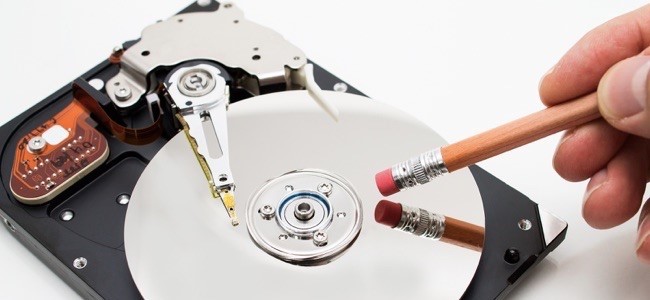In 2009 the National Archives and Records Administration had a data breach when it sent a hard drive for maintenance without sanitizing it first. In 2017, Washington State University lost a hard drive to burglary. The hard drive had over one million people’s financial and health records collected in a research study. These are two examples of the risk of failing to destroy data properly on storage that is not in use.
Cloud storage has further complicated the security of archived data. A good example is Home Depot’s 2014 cloud data breach that cost over $170 million in compensation. It highlights why secure data destruction is an essential task in information security for any organization today.
What is Professional Data Destruction?
Your data is very accessible after hitting the Delete key. A professional forensics expert with the right tools can extract it easily. Professional data destruction services use both digital and physical methods to erase and destroy data. Overwriting jumbles up the data and makes it incomprehensible. Degaussing uses magnetic fields to corrupt the data on a hard drive’s tracks.
Data erasure solutions also include physical destruction to make hard drives inoperable and impossible to extract data with forensic tools. Physical destruction methods include;
-
- Disintegrating- This is cutting the hard drive into small pieces
- Puncturing – This is drilling holes into the hard drive, which makes it useless
- Shredding – A special shredder is used to take apart the metal and plastic of the hard drive
- Melting – A hot molten compound is poured on the hard drive to melt it
This total physical destruction is the surest way to ensure the data is gone forever because advanced forensic have made it possible to extract data from partially damaged drives.
Professional data destruction should be a priority for any business, big or small, considering today’s advanced threats.
Here is why every business needs data erasure solutions;
Preventing Unauthorised Access
There are all kinds of nefarious people looking to access your data unauthorized. It might be the competition trying to peek into your R&D data or hackers trying to steal credit card information. Your data is valuable to outside parties in different ways.
Professional data destruction prevents this access, even when these threat actors get their hands on the data storage like your hard drives. It is impossible to put back a melted hard drive.
Remaining Legally Compliant
Laws regarding the security of private data have become more stringent as authorities rush to safeguard their citizens. In the US, these guidelines are covered by the Gramm-Leach-Bliley Act, the Fair and Accurate Credit Transactions Act, and the Health Insurance Portability and Accountability Act. These laws have grave implications for businesses that suffer data breaches from improper data storage and destruction. The $170 million paid out by Home Depot is a perfect example.
Businesses operating online with European customers must be compliant with the General Data Protection Regulation. The GDPR is particularly strict on data storage. It gives customers the ‘right to be forgotten,’ which requires complete data erasure of customers who demand that their data be erased. A business must respond to this request in 30 days.
Cost Cutting Measure
Data storage requires space, digital or physical, or sometimes both. Storing old hard drives in cabinets will take up valuable office space. Archival data in the clouds takes up space that costs the business money. Getting rid of useless data frees up these assets, which cuts costs.
Retain Brand Reputation
A data breach is very damaging to any business’s reputation. One study showed that 72% of small and medium enterprises that suffer data breaches close down within 24 months of the breach. A customer who suffers credit card information theft or identity theft is unlikely to return even after safeguards are put in place.
Data destruction and letting the customers know it is done is a good way of cultivating trust in your customers. They are sure that their data is no longer at risk. This is more true for businesses in the finance and health sectors.
Safe E-waste Disposal
Computer equipment has become a significant contributor to the electronic waste hazard. Hard drives are made of magnetic material, metal, and plastic and do not degrade quickly. This is why a business should choose to engage a professional data destruction company to handle the process. Incinerating and melting makes it easy to dispose of the remaining bits and pieces.
Professional data destruction services are very crucial for both small and big businesses. It keeps the business legally compliant, safeguards customer and business data, and helps avoid expensive fines and compensations. However, it is important to put the right professionals on the job to ensure that everything is properly done.
Do you have old data that you need to delete forever? Engaging professional data destruction services is the best route to take. Your brand will remain safe and trustworthy in a competitive environment where brand image is everything.
